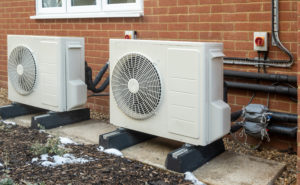There are many different energy sources and heating options available to warm your home during the winter. Gas, propane, electric, coal, and oil are among the most popular choices. With that being said, many homeowners struggle to know the difference between each system. Because New Jersey experiences its fair share of below-freezing temperatures, what works for a home in this climate might not work for a home that experiences milder winters.
Many homeowners throughout New Jersey rely on an electric heat pump or a furnace to keep their homes comfortable. While furnaces and heat pumps warm your indoor air when it’s cold out, choosing between the two systems can be challenging. Even though they serve the same purpose, how they go about heating your home is entirely different, and one might be more beneficial than the other. Several factors should be considered when choosing between them, including pricing and installation costs which vary based on the size and efficiency rating of the equipment.
Below, our professionals highlight the differences between an electric heat pump and a gas furnace installation to heat your home this season.
Heat Pump for Your House
A heat pump is a system that moves warm air to where it’s needed depending on the season. These systems take heat from the outdoor air, transfer it to a liquid refrigerant, and then pump the refrigerant to a coil or heat exchanger inside your home’s ductwork. The air blows across the coil and heats up, distributing warm air throughout the rooms in your home. During the warmer months, a heat pump can remove heat from within your house, exchanging it for cool, conditioned air.
Pros and Cons
To generate warmth, heat pumps run on electricity, drawing heat from the outside air and transferring it indoors. Because of this, they are typically recommended for homes in warmer climates. While they are more versatile—they provide heat in the winter and act as an air conditioner in the summer—they are prone to more wear and tear because they are used throughout the seasons. Heat pumps for your house are generally more energy efficient than a furnace, only if you live somewhere where the outdoor temperature is above freezing during the winter. Additionally, the average lifespan of a heat pump is significantly less than that of a furnace. Heat pumps generally last between 10-15 years, whereas a furnace lasts upwards of 20-30 years.
Gas Furnace for Your Home
A furnace is a forced hot air heating system connected to the ductwork in your home. There are several different sources available, such as oil, gas, and electricity, to heat a burner. The heat from the burner then transfers to a heat exchanger, where a fan blows air across the exchanger, producing warm air throughout the rooms in your home.
Pros and Cons
Furnaces use an energy source, like natural gas, to create their own heat rather than relying on moving the heat from the outdoor air. The biggest benefit of a furnace is that it will heat your home in any climate, regardless of the outside temperature. Because furnaces only provide heat, you will need a separate air conditioning unit to cool your home in warmer months. As far as efficiency goes, furnaces are more energy efficient in colder climates than heat pumps since they don’t run on electricity. With preventative maintenance, your furnace can last for up to 30 years.
Why Choose Clay’s Climate Control This Season?
If you still have questions about the advantages of an electric heat pump or converting your current system to something more cost-effective, contact the experts at Clay’s Climate Control! Our team can help determine which heating system is best for your home and make recommendations to enhance your energy efficiency. Connect with us today at 609-916-1106 to learn more about our heating services.

